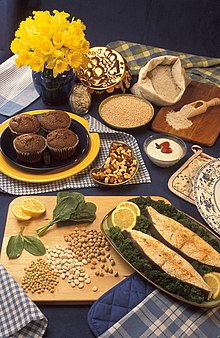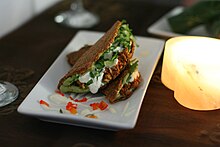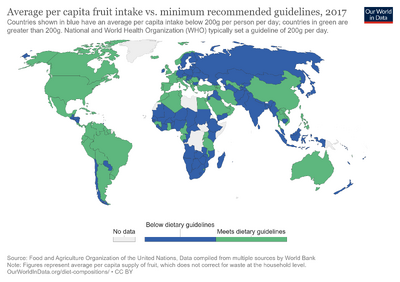Diet (nutrition)
In nutrition, diet is the sum of food consumed by a person or other organism.[1] The word diet often implies the use of specific intake of nutrition for health or weight-management reasons (with the two often being related). Although humans are omnivores, each culture and each person holds some food preferences or some food taboos. This may be due to personal tastes or ethical reasons. Individual dietary choices may be more or less healthy.
Complete nutrition requires ingestion and absorption of vitamins, minerals, essential amino acids from protein and essential fatty acids from fat-containing food, also food energy in the form of carbohydrate, protein, and fat. Dietary habits and choices play a significant role in the quality of life, health and longevity.
Health

A healthy diet can improve and maintain optimal health. In developed countries, affluence enables unconstrained caloric intake and possibly inappropriate food choices.[2]
Health agencies recommend that people maintain a normal weight by limiting consumption of energy-dense foods and sugary drinks, eating plant-based food, limiting consumption of red and processed meat, and limiting alcohol intake.[3]
The Dietary Guidelines for Americans is an evidence-based information source that policy makers and health professionals use to advise the general public about healthy nutrition.
Dietary choices

Many do not eat food from animal sources to varying degrees (e.g. flexitarianism, pescetarianism, vegetarianism, veganism) for health reasons, issues surrounding morality, or to reduce their personal impact on the environment, although some[which?] of the public assumptions about which diets have lower impacts are known to be incorrect.[4][needs update] Out of the above diets, veganism is the most selective.[5] People on a balanced vegan diet can get all necessary nutrients, but may need to specifically focus on consumption of nutrients like protein, iron, calcium, zinc, and vitamin B12.[6]
Raw foodism is another contemporary trend.
Weight management
A particular diet may be chosen to promote weight loss or weight gain. Changing a subject's dietary intake, or "going on a diet", can change the energy balance and increase or decrease the amount of fat stored by the body. The terms "healthy diet" and "diet for weight management" (dieting) are often related, as the two promote healthy weight management.[7][8] If a person is overweight or obese, changing to a diet and lifestyle that allows them to burn more calories than they consume may improve their overall health, possibly preventing diseases that are attributed in part to weight, including heart disease and diabetes.[9] Conversely, if a person is underweight due to illness or malnutrition, they may change their diet to promote weight gain. Intentional changes in weight, though often beneficial, can be potentially harmful to the body if they occur too rapidly. Unintentional rapid weight change can be caused by the body's reaction to some medications, or may be a sign of major medical problems including thyroid issues and cancer among other diseases.[10]
Eating disorders
An eating disorder is a mental disorder that interferes with normal food consumption. It is defined by abnormal eating habits and thoughts about food that may involve eating much more or much less than needed.[11] Common eating disorders include anorexia nervosa, bulimia nervosa, and binge-eating disorder.[12] Eating disorders affect people of every gender, age, socioeconomic status, and body size.[12]
Religious and cultural dietary choices
Some cultures and religions have restrictions concerning what foods are acceptable in their diet. For example, only Kosher foods are permitted in Judaism, and Halal foods in Islam. Although Buddhists are generally vegetarians, the practice varies and meat-eating may be permitted depending on the sects.[13] In Hinduism, vegetarianism is the ideal. Jains are strictly vegetarian and in addition to that the consumption of any roots (ex: potatoes, carrots) is not permitted.
In Christianity there is no restriction on kinds of animals that can be eaten,[14][15] Various groups within Christianity have practiced specific dietary restrictions for various reasons.[16] The most common diets used by Christians are Mediterranean and vegetarianism.[17][18][19][20]
Diet classification table
| Food type | Omnivorous | Carnivorous | Pescetarian | Pollotarian | Semi-vegetarian | Vegetarian | Vegan | Fruitarian | Paleo | Ketogenic | Jewish | Islamic | Hindu | Jain |
|---|---|---|---|---|---|---|---|---|---|---|---|---|---|---|
| Alcoholic drinks | Yes | No | Yes | Yes | Yes | Yes | Yes | No | No | Maybe | Maybe | No | Maybe | No |
| Fruit | Yes | No | Yes | Yes | Yes | Yes | Yes | Yes | Yes | No | Yes | Yes | Yes | Maybe |
| Berries | Yes | No | Yes | Yes | Yes | Yes | Yes | Yes | Yes | Maybe | Yes | Yes | Yes | Yes |
| Vegetables | Yes | No | Yes | Yes | Yes | Yes | Yes | No[lower-alpha 1] | Yes | Yes | Yes | Yes | Yes | Yes |
| Greens | Yes | No | Yes | Yes | Yes | Yes | Yes | No | Yes | Yes | Yes | Yes | Yes | Maybe |
| Legumes | Yes | No | Yes | Yes | Yes | Yes | Yes | Maybe | No | No | Yes | Yes | Yes | Yes |
| Nuts | Yes | No | Yes | Yes | Yes | Yes | Yes | Maybe | Yes | Maybe | Yes | Yes | Yes | Maybe |
| Tubers | Yes | No | Yes | Yes | Yes | Yes | Yes | No | Maybe[lower-alpha 2] | No | Yes | Yes | Yes | Maybe |
| Grains | Yes | No | Yes | Yes | Yes | Yes | Yes | Maybe | No | No | Yes | Yes | Yes | Yes |
| Honey | Yes | No | Yes | Yes | Yes | Yes | No | No | Yes | No | Yes | Yes | Yes | No |
| Dairy | Yes | Maybe[lower-alpha 3] | Maybe | Maybe | Maybe | Maybe[lower-alpha 4] | No | No | No | Maybe | Yes[lower-alpha 5] | Yes | Yes | Yes |
| Eggs | Yes | Yes | Maybe | Yes | Maybe | Maybe[lower-alpha 6] | No | No | Yes | Yes | Yes | Yes | Maybe | No |
| Insects | Yes | Yes | No | No | Sometimes | No | No | No | Yes | Yes | No[lower-alpha 7] | No[lower-alpha 7] | Maybe | No |
| Shellfish | Yes | Yes | Yes | No | Sometimes | No | No | No | Yes | Yes | No | Maybe[lower-alpha 8] | Maybe | No |
| Fish | Yes | Yes | Yes | No | Sometimes | No | No | No | Yes | Yes | Yes | Yes | Maybe | No |
| Poultry | Yes | Yes | No | Yes | Sometimes | No | No | No | Yes | Yes | Yes | Yes | Maybe | No |
| Mutton | Yes | Yes | No | No | Sometimes | No | No | No | Yes | Yes | Yes | Yes | Maybe | No |
| Venison | Yes | Yes | No | No | Sometimes | No | No | No | Yes | Yes | Yes | Yes | Maybe | No |
| Pork | Yes | Yes | No | No | Sometimes | No | No | No | Yes | Yes | No | No | Maybe | No |
| Beef | Yes | Yes | No | No | Sometimes | No | No | No | Yes | Yes | Yes | Yes | Maybe}} | No |
Notes
- ↑ Some plants traditionally considered to be vegetables—such as tomatoes, eggplants, capsicums, and zucchinis—are permitted.
- ↑ Typically, potatoes are not permitted but cassava, yams, and sweet potatoes are.
- ↑ Some variants of the diet are paleolithic-oriented and exclude dairy while other variants may include dairy products provided that they are ketogenic. Less strict approaches allow all animal sourced foods.
- ↑ Lacto vegetarians, ovo-lacto vegetarians, and Jain vegetarians permit dairy.
- ↑ Dairy is permitted but is not to be cooked or consumed with any meats. Dairy may be prepared and eaten alongside pareve foods.
- ↑ Both ovo vegetarians and ovo-lacto vegetarians permit eggs.
- ↑ 7.0 7.1 Locusts are sometimes permitted, depending on the religious denomination.
- ↑ Mollusks and crustaceans like crab are prohibited according to the Shi'a branch of Islam. The acceptability of shrimp/prawn is debated
See also
References
- ↑ noun, def 1 Archived 2010-01-07 at the Wayback Machine – askoxford.com
- ↑ "Told to Eat Its Vegetables, America Orders Fries" Archived 2022-06-06 at the Wayback Machine article by Kim Severson in The New York Times September 24, 2010, accessed September 25, 2010
- ↑ "Policy and Action for Cancer Prevention Food, Nutrition, and Physical Activity" (PDF). World Cancer Research Fund & American Institute for Cancer Research. 2010. Archived from the original (PDF) on 2015-09-11. Retrieved 2016-04-28.
- ↑ The embodied energy of food: the role of diet DA Coley, E Goodliffe, J Macdiarmid (1998) Energy Policy 26 (6), 455-460
- ↑ "Vegetarian diet: How to get the best nutrition". Mayo Clinic. Archived from the original on 2021-04-10. Retrieved 2021-04-06.
- ↑ Melina, Vesanto; Craig, Winston; Levin, Susan (December 2016). "Position of the Academy of Nutrition and Dietetics: Vegetarian Diets". Journal of the Academy of Nutrition and Dietetics. 116 (12): 1970–1980. doi:10.1016/j.jand.2016.09.025. ISSN 2212-2672. PMID 27886704. Archived from the original on 2021-07-23. Retrieved 2022-07-09.
- ↑ "Healthy Eating: How do you get started on healthy eating?". Webmd.com. 2009-10-12. Archived from the original on 2018-03-01. Retrieved 2011-12-11.
- ↑ Aphramor, Lucy (2010-07-20). "Validity of claims made in weight management research: a narrative review of dietetic articles". Nutrition Journal. 9 (1): 30. doi:10.1186/1475-2891-9-30. ISSN 1475-2891. PMC 2916886. PMID 20646282.
- ↑ "Diets". medlineplus.gov. Archived from the original on 2021-06-13. Retrieved 2021-05-28.
- ↑ "Body Weight". MedlinePlus. Archived from the original on June 2, 2020. Retrieved June 26, 2020.
- ↑ "Eating Disorders". medlineplus.gov. Archived from the original on 2020-04-10. Retrieved 2020-04-10.
- ↑ 12.0 12.1 "NIMH » Eating Disorders". www.nimh.nih.gov. Archived from the original on 2015-05-23. Retrieved 2020-04-10.
- ↑ Keown, Damien (26 August 2004). A Dictionary of Buddhism. Oxford University Press. p. 77. ISBN 9780191579172. Archived from the original on 12 May 2022. Retrieved 9 July 2022.
- ↑ Marcos 7:14 Archived 2021-11-04 at the Wayback Machine-23 Archived 2021-11-04 at the Wayback Machine
- ↑ Mateo 15:10 Archived 2021-11-05 at the Wayback Machine-20 Archived 2021-11-04 at the Wayback Machine
- ↑ "Code of Canon Law". vatican.va. Archived from the original on November 29, 2020. Retrieved July 28, 2013.
- ↑ James Tabor, The Jesus Dynasty p. 134 and footnotes p. 335, p. 134 – "The Greek New Testament gospels says John's diet consisted of "locusts and wild honey" but an ancient Hebrew version of Matthew insists that "locusts" is a mistake in Greek for a related Hebrew word that means a cake of some type, made from a desert plant, similar to the "manna" that the ancient Israelites ate in the desert on the days of Moses.(ref 9) Jesus describes John as "neither eating nor drinking," or "neither eating bread nor drinking wine." Such phrases indicate the lifestyle of one who is strictly vegetarian, avoids even bread since it has to be processed from grain, and shuns all alcohol.(ref 10) The idea is that one would eat only what grows naturally.(ref 11) It was a way of avoiding all refinements of civilization."
- ↑ Bart D. Ehrman (2003). Lost Christianities: The Battles for Scripture and the Faiths We Never Knew. Oxford University Press. pp. 102, 103. ISBN 978-0-19-514183-2. p. 102 – "Probably the most interesting of the changes from the familiar New Testament accounts of Jesus comes in the Gospel of the Ebionites description of John the Baptist, who, evidently, like his successor Jesus, maintained a strictly vegetarian cuisine."
- ↑ James A. Kelhoffer, The Diet of John the Baptist Archived 2022-05-13 at the Wayback Machine, ISBN 978-3-16-148460-5, pp. 19–21
- ↑ G.R.S. Mead (2007). Gnostic John the Baptizer: Selections from the Mandæan John-Book. Forgotten Books. p. 104. ISBN 978-1-60506-210-5. Archived from the original on 2020-03-13. Retrieved 2022-07-09. p. 104 – "And when he had been brought to Archelaus and the doctors of the Law had assembled, they asked him who he is and where he has been until then. And to this he made answer and spake: I am pure; [for] the Spirit of God hath led me on, and [I live on] cane and roots and tree-food."
External links
| Wikiquote has quotations related to: Diet |
 The dictionary definition of diet at Wiktionary
The dictionary definition of diet at Wiktionary
- Webarchive template wayback links
- All articles with specifically marked weasel-worded phrases
- Articles with specifically marked weasel-worded phrases from April 2021
- Articles with invalid date parameter in template
- Wikipedia articles in need of updating from April 2021
- All Wikipedia articles in need of updating
- Portal templates with all redlinked portals
- Diets
